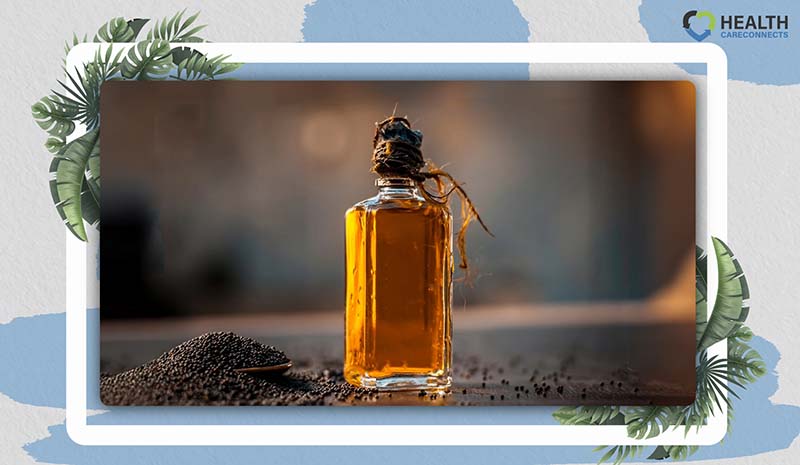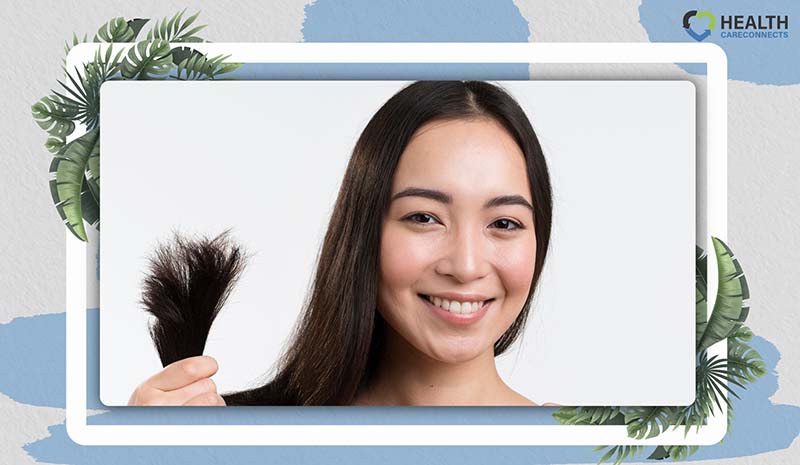You might have heard about the numerous health benefits of mustard oil, also known as sarson ka tael. It’s a staple in Indian cooking and is renowned for its ability to boost immunity, ward off colds and flu, and improve skin health.
But did you know that mustard oil is equally beneficial for your hair? If you’re wondering, “is mustard oil good for hair” the answer is a resounding yes. People seeking high volume, shiny, and smooth hair have been using mustard oil for ages, thanks to its many advantages for hair health.
Using mustard oil as part of your hair care routine can lead to noticeable improvements in hair texture, strength, and overall appearance.
Is Mustard Oil Good for Hair?
Most of the clinical studies on mustard oil have focused on its cardiovascular benefits or its anti-inflammatory properties, with only a few examining its effects on hair loss and scalp health. These studies were conducted in laboratory settings, often using higher concentrations of the substance than what would typically be applied to the human scalp.
The potential hair benefits of mustard oil are often inferred from the properties of its components rather than demonstrated through clinical research. While these effects may indeed be possible, there’s currently insufficient evidence to confirm their effectiveness when used on the scalp, under specific conditions, or to what degree:
- Antioxidant Properties: Mustard oil is rich in Vitamins A and E, as well as amino acids like cysteine, which have antioxidant capabilities.
- UV Protection and Anti-Aging: The vitamin E in mustard oil is known to support hair health, offering benefits like UV protection and anti-aging effects.
- Conditioning and Hydrating Properties: It contains alpha-linoleic acid, a fatty acid known for its ability to condition and hydrate hair.

Notes
- While the potential benefits are promising, it’s important to perform a patch test before applying mustard oil to your scalp, as it can cause irritation in some people.
- Regular, gentle scalp massages with mustard oil can promote relaxation and improve blood circulation, contributing to overall scalp health.
Benefits of Mustard Oil for Hair
Reduces Scalp Inflammation
“Mustard oil is rich in fatty acids, such as omega-3s and 6s, and various minerals, including calcium, iron, and zinc, which can provide essential nutrients and act as anti-inflammatories,” says Jennifer Chwalek, MD, a board-certified dermatologist at Union Square Laser Dermatology in New York City.
Contains Powerful Antioxidant Properties
The presence of antioxidants in mustard oil, such as vitamin E, helps prevent oxidative stress and damage to hair follicles, thereby protecting the hair and scalp.
Offers Antibacterial and Antifungal Benefits
Mustard oil for hair contains alpha-linolenic acid (ALA) and high uric acid content, which help cleanse the scalp by eliminating fungi and bacteria that accumulate on the scalp and block hair follicles.
Supports Hair Growth
Enriched with a multitude of vitamins such as E, K, and A, mustard oil promotes hair growth.
Being a good source of iron, magnesium, antioxidants, and calcium, besides zinc and beta-carotene, mustard oil also helps address the concern of premature greying.

Enhances the Overall Appearance and Texture of Hair
Mustard oil protects hair from day-to-day damage due to its fatty acid content. It fills the gaps between cuticle cells, thereby making hair shinier and smoothing split ends.

Eradicates Ticks
According to William Gaunitz, a certified trichologist and founder of the Gaunitz Trichology Method, hair loss can sometimes be caused by a parasite known as Demodex folliculorum, a type of mite that lives on human skin.
Gaunitz notes that mustard seed can kill these mites. However, since Demodex folliculorum feed on oil, Gaunitz advises against using mustard oil on the scalp and instead recommends tinctures made with ground mustard powder as a better option.
Notes
- Mustard oil is rich in vitamins and minerals like beta-carotene, iron, fatty acids, and magnesium, all of which promote hair health.
- It’s an excellent natural conditioner that can help manage dry and frizzy hair, making it more manageable and smooth.
- Regular scalp massages with mustard oil can stimulate blood circulation, promoting healthier hair growth.
- Its antifungal and antibacterial properties can help maintain scalp health and reduce dandruff.
Instructions for Effectively Using Mustard Oil on Hair
Mustard oil can be used in various ways to enhance hair health and promote growth. Here are some effective methods:
Mustard Oil as a Pre-Shampoo Treatment
- Step 1: Massage a small quantity of mustard oil onto your scalp.
- Step 2: Continue massaging for about five minutes.
- Step 3: Shampoo your hair as usual.
Mustard Oil Hair Mask
- Step 1: Prepare a mixture of oils, using one tablespoon each of:
Mustard oil
Almond oil
Jojoba oil
- Step 2: Apply this oil mask thoroughly to your hair and scalp.
- Step 3: Leave it on for at least 30 minutes.
- Step 4: Rinse with shampoo.
Mustard Oil and Banana Pack
- Step 1: Take two ripe bananas and blend them with mustard oil to make a thick paste.
- Step 2: Add one spoon of yoghurt for better consistency.
- Step 3: Apply the mixture to your scalp to prevent dry, frizzy, and brittle hair.
Mustard Oil and Yoghurt Pack
- Step 1: Mix 5-6 spoons of yoghurt with one spoon of mustard oil in a bowl.
- Step 2: Apply this pack to your scalp.
- Step 3: Wash your hair after 40-60 minutes.
Notes
- Consistency: Regular use of these treatments can lead to healthier, shinier hair.
- Blending: Combining mustard oil with other oils like coconut or olive oil can enhance its conditioning effects.
Possible Side Effects of Mustard Oil on Hair
External application of mustard oil for hair generally has minimal side effects. However, naturally occurring compounds like allyl thiocyanate, erucic acid, and capsaicin may cause mild irritation to the scalp in sensitive individuals.
Potential Side Effects include:
- Scalp Irritation: Some people might experience mild irritation due to the compounds in mustard oil.
- Clogged Root Inlets: In rare cases, mustard oil might clog hair follicles, leading to scalp issues.
- Eye Irritation: Care should be taken to avoid contact with eyes, as it can cause irritation.
Notes
- Sensitive Skin: If you have sensitive skin or are prone to allergies, consider diluting mustard oil with other carrier oils to minimize the risk of irritation.
- Application Caution: Avoid applying mustard oil too close to the hairline or eyes to prevent accidental eye irritation.
FAQs
Does Mustard Oil Reduce Hair Fall?
Yes, mustard oil strengthens hair from the roots and reduces hair fall due to its omega-3 and omega-6 fatty acids, vitamin E, and antioxidants.
Can I Apply Mustard Oil at Night?
Yes, you can apply mustard oil and leave it on overnight. Its warmth may also promote better sleep after a thorough massage.
Does Mustard Oil Darken Hair?
Yes, mustard oil has natural coloring and conditioning properties. Regular use, especially with henna, can darken hair and cover grey hair without damage.
Conclusion
Mustard oil offers a unique flavour profile and potential health benefits due to its essential fatty acids, antioxidants, and vitamins. While it’s important to be aware of potential side effects, using mustard oil in moderation and with caution can make it a valuable addition to a balanced diet.
As for its topical uses, many wonder, “Is mustard oil good for hair?” While there are anecdotal claims and some lab-based studies suggesting benefits, more research is needed to confirm these effects. Embrace the distinct taste and possible advantages of mustard oil while being mindful of its limitations to maximize its culinary, health-enhancing, and potential hair care benefits.
For those seeking more information and honest product reviews, I recommend visiting HealthCareConnect.

Dr. Joyce Slater: Your Guide to Informed Health Choices
Dr. Joyce Slater shines as a distinguished expert in the field of nutrition and public health. Contributing her vast expertise to HealthConnectbc, she embodies a deep-seated passion for enhancing public well-being. As a respected figure in her field. Dr. Slater’s academic journey and professional achievements are nothing short of inspirational.
Holding a significant position as a researcher and educator, Dr. Slater has delved deeply into the intricacies of food literacy and nutritional science. Her work, prominently featured in numerous esteemed scientific publications, underscores her dedication to expanding our understanding of food’s role in health and society.
At the heart of Dr. Slater’s professional ethos is a profound desire to positively impact individual lives through education and research. She often says, “Empowering people with the knowledge to make healthier choices is the most rewarding aspect of my work.” This principle is the cornerstone of her involvement with HealthConnectbc, where she strives to provide reliable and practical health advice.
Dr. Slater’s contributions to HealthConnectbc are multifaceted: academically, she offers insights into the complex world of nutrition and health, enhancing both public understanding and professional practices. Additionally, she is instrumental in guiding and inspiring the next generation of health professionals, thus fostering future excellence in the field.
Juggling rigorous research with her educational duties, Dr. Slater demonstrates an unwavering commitment to her profession. Her approachable nature and genuine concern transcend the confines of academia, touching the lives of everyone she interacts with. Dr. Slater looks forward to continuing her journey of discovery and education, dedicated to the ongoing improvement of public health and nutrition.
At HealthConnectbc, Dr. J. Slater is not just a contributor; she is a guiding light, dedicated to enlightening and motivating individuals towards a healthier and more informed lifestyle.
PUBLISHED ARTICLES
- Food literacy competencies: A conceptual framework for youth transitioning to adulthood (2018)
- Self-perceived eating habits and food skills of Canadians (2016)
- Challenges to acquiring and utilizing food literacy: Perceptions of young Canadian adults (2016)
- Socio-demographic and geographic analysis of overweight and obesity in Canadian adults (2009)
- Sustainable well-being: Concepts, issues, and educational practices (2014)


